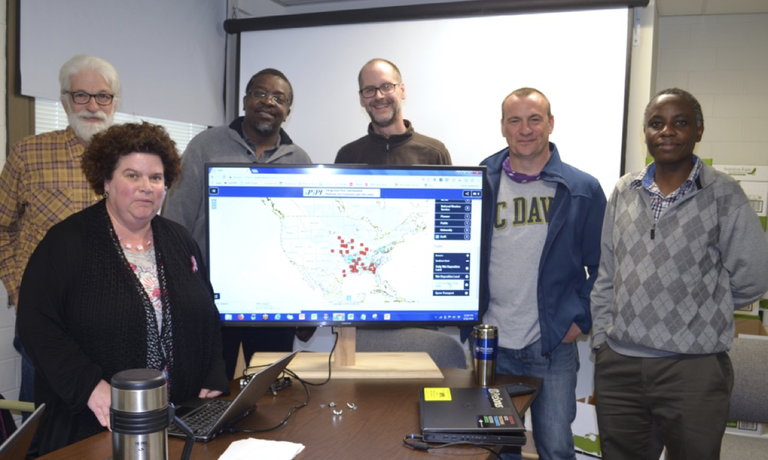Posted: April 23, 2018
Thanks to funds from the Department of Plant Pathology and Environmental Microbiology’s Francl Endowment, the program of Dr. Paul Esker hosted Drs. Sarah Pethybridge (Cornell University), Neil McRoberts (University of California-Davis), Pierce Paul (Ohio State University) and Peter Ojiambo (North Carolina State University) from April 16 to 20.

From front left to right: Drs. Sarah Pethbridge (Cornell University), Scott Isard (PSU-PPEM), Pierce Paul (Ohio State University), Paul Esker (PSU-PPEM), Neil McRoberts (UC-Davis), and Peter Ojiambo (North Carolina State University)
The visit provided the group an opportunity to discuss research and education in plant disease epidemiology with the goal to define new directions that the group could take in the future to strengthen and increase current collaborations. Dr. Scott Isard (PSU-PPEM) also participated in the discussions and presented to the group the current iteration of the Integrated Pest Information Platform for Extension and Education (iPiPE). It was not all work as the group also found some time to discuss a few other things like baseball and cricket, making for an enjoyable week for all!
The format for the meetings was informal, thus enabling an open and honest discussion where participants shared their current research, potential ideas, and how best to strengthen existing collaborations. By the end of the week, the group had defined two new collaborations related to (1) the development of a paper regarding experiences and tips for improving data analysis and interpretation of results obtained from plant pathological studies and (2) theoretical and empirical research regarding the use and importance of thresholds in integrated disease management. Furthermore, the visitors had a chance to interact with other faculty, postdocs, and graduate students during their visit, which will also increase further collaborations on joint topics of interest in the future.
A final outcome from the visit and discussions was the agreement that each member of the working group will take a turn hosting the meeting in the future on an annual basis. All participants recognized the importance of having such a face-to-face meeting in order to define new possibilities for collaborations and establish realistic outcomes for such efforts. While technology works very well to do many of the things that we currently do as academics, nothing is better than actually sitting down in the same place for face-to-face meetings.

